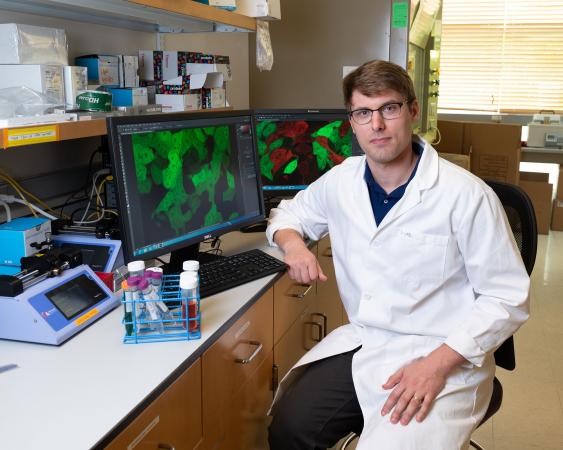James Dahlman, assistant professor in the Wallace H. Coulter Department of Biomedical Engineering at Georgia Tech and Emory, and a researcher in the Petit Institute for Bioengineering and Bioscience at Georgia Tech, received the Gene Delivery and Gene Editing Focus Group (GDGE) Young Investigator Award given by the Controlled Release Society.
This is his second gene-related new investigator award in 2020 as he previously won the Outstanding New Investigator Award given by the American Society of Gene & Cell Therapy (ASGCT) earlier this year. He is also the recipient of the Outstanding Achievement in Early Career Research 2020 award given by the Georgia Institute of Technology.
Dahlman's laboratory works at the interface of drug delivery and genomics by applying "big data" and "technology development" approaches to nanomedicine. Dahlman and his students have developed DNA barcoded nanoparticles to measure how hundreds of nanoparticles deliver mRNA and siRNA in multiple cell types in vivo, all from a single animal. Since late 2016, the lab has used this approach to quantify more than 4,500 nanoparticles in vivo, thereby identifying nanoparticles that target new cell types without ligands. His lab hopes to apply systems biology approaches to nanomedicine, in order to improve the efficacy of gene therapies and identify genes acting as master regulators of nanoparticle delivery in vivo.
Dahlman explained that using DNA barcodes allows researchers to overcome what had been a laborious and time-consuming process. Now hundreds of different nanoparticle types can be tested at once to see which are more effective to safely deliver drugs. His research has spawned the creation of a new company called GuideRX.
About the Gene Delivery and Gene Editing Focus Group in CRS:
The Gene Delivery and Gene Editing Focus Group (GDGE) focuses on creating a better fundamental understanding of the barriers of gene delivery and editing, designing improved carriers, and realizing opportunities for therapeutic intervention. Relevant topics include nucleic acid-based approaches for generating therapeutic proteins (e.g. mRNA, pDNA), eliminating disease-causing proteins (e.g. SiRNA, miRNA, ASOs), and precisely editing the genome (e.g. CRISPR/Cas, TALENs, ZFNs).
About the Controlled Release Society:
The Controlled Release Society (CRS) is a not-for-profit organization devoted to the science and technology of controlled release. The field of controlled release encompasses scientific and technical efforts to regulate the spatial and temporal effects of agents in diverse areas including human and animal health as well as non-pharmaceutical areas.
Media Contact:
Walter Rich
Communications Manager
Wallace H. Coulter Department of Biomedical Engineering
Georgia Institute of Technology
Media Contact
Walter Rich
Keywords
Latest BME News
Jo honored for his impact on science and mentorship
The department rises to the top in biomedical engineering programs for undergraduate education.
Commercialization program in Coulter BME announces project teams who will receive support to get their research to market.
Courses in the Wallace H. Coulter Department of Biomedical Engineering are being reformatted to incorporate AI and machine learning so students are prepared for a data-driven biotech sector.
Influenced by her mother's journey in engineering, Sriya Surapaneni hopes to inspire other young women in the field.
Coulter BME Professor Earns Tenure, Eyes Future of Innovation in Health and Medicine
The grant will fund the development of cutting-edge technology that could detect colorectal cancer through a simple breath test
The surgical support device landed Coulter BME its 4th consecutive win for the College of Engineering competition.








